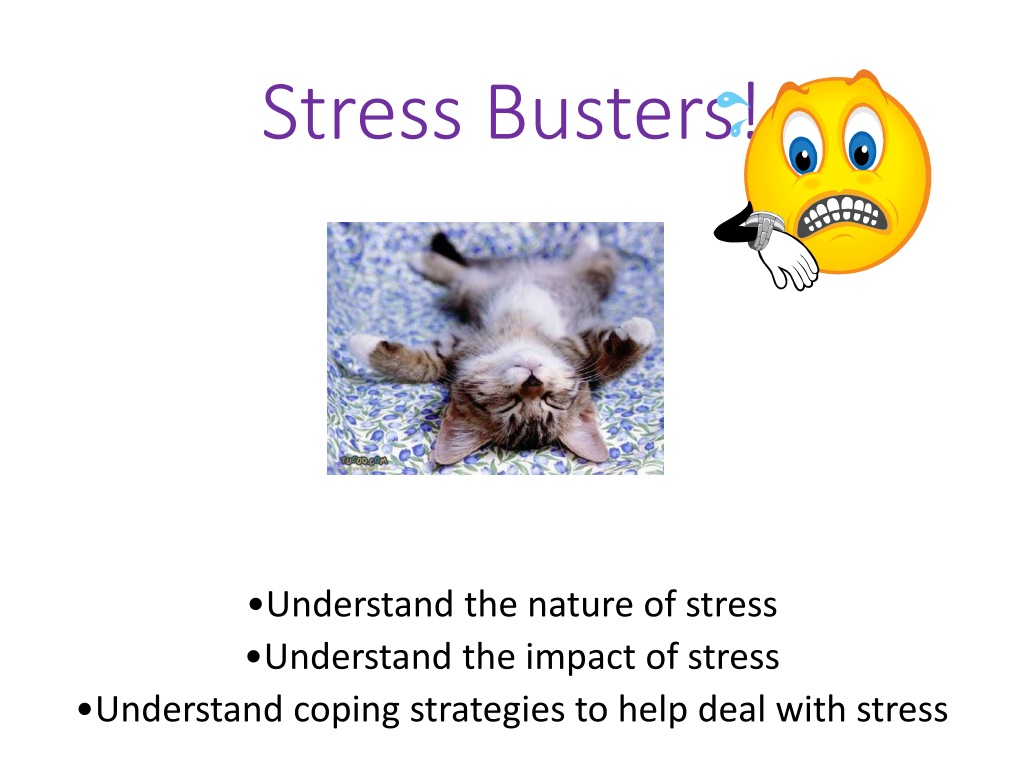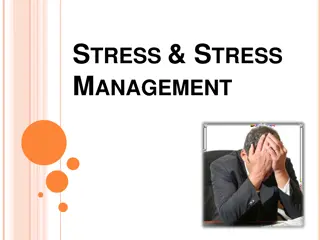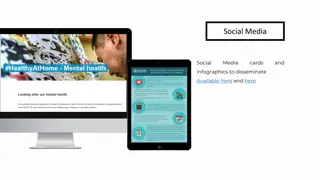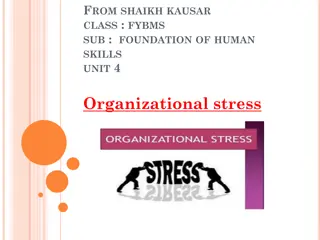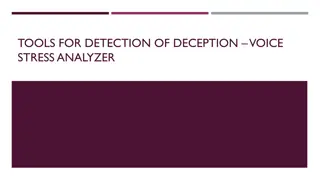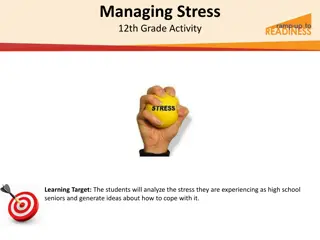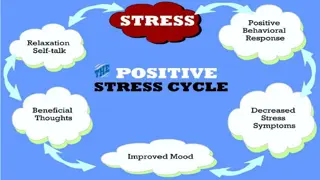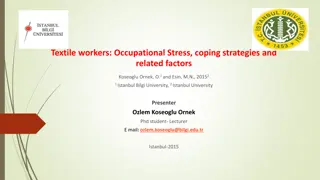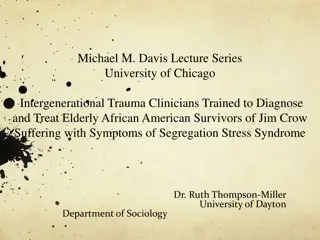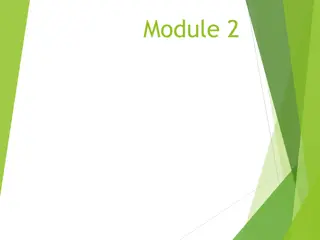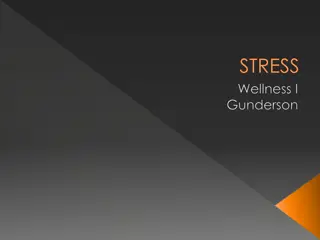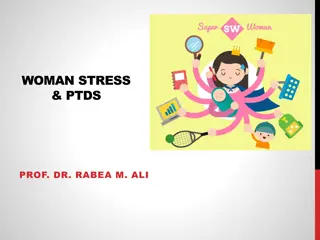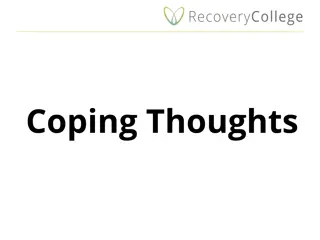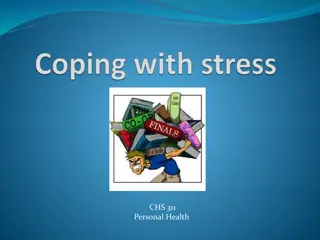Understanding Stress and Coping Strategies
Understanding the nature and impact of stress is crucial in managing it effectively. Stress is a common experience with various physiological, physical, psychological, and behavioral effects. Coping strategies are essential to deal with stressors such as anxiety, overdrive, and constant stress factors like money worries, workloads, relationships, bullying, and exams. Learn to recognize the signs of stress and implement coping mechanisms to maintain mental well-being.
Download Presentation

Please find below an Image/Link to download the presentation.
The content on the website is provided AS IS for your information and personal use only. It may not be sold, licensed, or shared on other websites without obtaining consent from the author. Download presentation by click this link. If you encounter any issues during the download, it is possible that the publisher has removed the file from their server.
E N D
Presentation Transcript
Stress Busters! Understand the nature of stress Understand the impact of stress Understand coping strategies to help deal with stress
What is Stress? Most commonly it s a mix of anxiety (tension, nerves) and depression (feeling flat/sad) Stress is very common we all have stress in our lives and there are times when this is worse that others. Think of blood pressure we all have it, but if it becomes high we need to do something about it!
Shaky Person What stresses do young people today face? What do you think stresses your young person?
Anxiety: Fight or Flight? Anxiety: Fight or Flight? Body prepares to run for its life Body prepares to fight for its life Normal response to a situation where you feel under threat e.g. walk out in front of a car, chased by a dog etc
Not so helpful when It goes into overdrive and constant stressors get on top of you such as: Money worries Unmanageable workload Relationship problems Being bullied Isolation Sitting exams!
Physiological response Blood needed in limbs Need this fast Away from surface Pale face Heart speeds up Palpitations Conserve energy Digestion slows down Dump non- essential weight Rapid use of blood glucose Feel sick Body needs to be light for speed Need energy from glucose Brain on high alert Emotional Urge to go to toilet! Dry mouth Tearful/angry response
Physical effects Physical effects Rapid, uneven heartbeat Chest pain Over-breathing/ breathlessness Dizziness Headaches Sweating and hot flushes Tingling / numbness Choking sensations Dry mouth Nausea, vomiting and diarrhoea Muscle aches and pains Restlessness, tremors and shaking
Psychological & Behavioural effects Psychological & Behavioural effects Worrying Mind racing/going blank Poor concentration/memory Indecisive Irritability, impatience, anger Confusion Restlessness Sleep disturbance Avoidance of situations Obsessive/compulsive behaviour Discomfort in social situations Phobic behaviour
What coping mechanisms do you have as adults?
Group discussion Out of all of these coping mechanisms which ones are positive? Do the negative ones help to help or hinder stress?
Positive Coping Strategies Positive Coping Strategies Being more active Reducing alcohol Relaxation (CD) Sleep Being aware of negative thinking Cognitive Behavioural Therapy (CBT) approach Living Life to the Full (DVD)
Positive Coping Strategies Positive Coping Strategies Take responsibility for improving physical and emotional wellbeing Avoiding pitfalls by addressing negative attitudes that add to the stress your experiencing Learning better communication skills to ease and improve relationship with managers and colleagues
Positive Coping Strategies Positive Coping Strategies Healthy food choices low blood sugar makes you feel anxious an irritable, over eating can make you feel lethargic and sluggish. Eat small but frequent meals to keep your energy up and avoid mood swings
Time management tips to reduce Time management tips to reduce stress stress Create a balanced schedule: - All work and no play is a recipe for burnout. Find a balance between work, family life, social activities, solitary pursuits, daily responsibilities and downtime Avoid over committing yourself:- Avoid scheduling things back to back. Distinguish between the shoulds and the musts Try to leave earlier in the morning:- avoid adding to your stress by running late! Plan regular breaks:- take time out to recharge, clear your mind you ll be more productive and feel better!
Reduce stress by improving emotional Reduce stress by improving emotional intelligence intelligence Self Awareness the ability to recognise your emotions and their impact on yourself and others Self-management- the ability to control your emotions and behaviour to adapt to changing circumstances Social Awareness- the ability to sense, understand, react to others emotions and feel comfortable socially Relationship management the ability to inspire, influence and connect to others and manage conflict
What one thing will you change when What one thing will you change when managing stress with your young person? managing stress with your young person?
Here is what they have told us Here is what they have told us Leave them alone Do not react when they are in a mood Hate being shouted at Ask what can I do to help you right now sometimes it is back to number 1 of being left alone!! Offer an ear but not advice Don t say Don t worry about it, it s not a big deal remember it is to them
